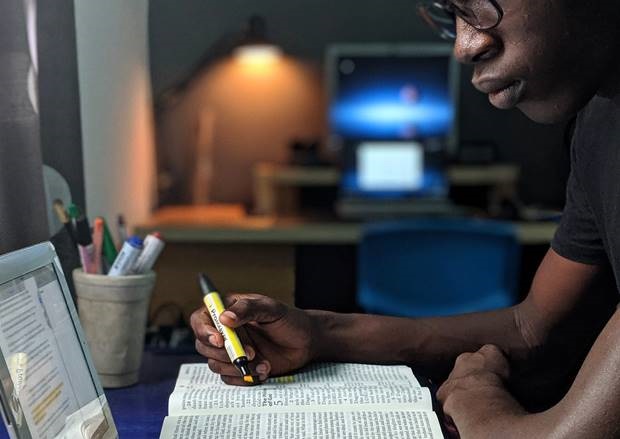
Much is said about the sad results of the 2016 Progress in International Reading Literacy Study (PIRLS) that revealed that 78% of South Africa's grade 4 learners cannot read for meaning.
Researchers will competently show that this is not a consequence of technology in South Africa; there are a number of other factors at play.
At a recent talk I attended though, a speaker made much of the negative consequences that technology has on children, and on their reading.
Considering that so many would suggest that technology will enable weaker education systems to leapfrog more successful and advanced ones, and that there is a strong political will to provide learners with tablets, I thought I needed to do some research.
Is it reading or technology or reading and technology?
What we have to do to read a text successfully
I would like to start at the point that the learner has already had success with the basics. In other words, the learner has an understanding that words are made up of sounds because of phonemic awareness teaching.
Effective phonics instruction has given the child the ability to identify and sound out letters. The learner has been helped to develop a sight word vocabulary to help with phonically irregular words.
In English, think of the word ‘the’ and what it would sound like spelled out. Unless taught as a sight word ‘the’ with its similar irregular friends would make it difficult to read fluently.
The goal is to achieve automaticity (the ability to read automatically and without thinking at a conscious level). Then the learner has been taught how punctuation allows us to make meaningful sentences, and has a large enough vocabulary to understand the words that have been read.
Once this is all done, the learner needs to develop fluency and speed so that they can get to the end of a sentence while the words are still in their working memory to make sense of its meaning.
Too much time and cognitive effort sounding out a word means less is held in memory and there is a strong chance the learner will have forgotten what they read at the beginning of the sentence – making it impossible to make meaning of what was just read.
This skill set will allow a child to read an age appropriate text by the end of Grade 3. From Grade 4, a learner is expected to learn more and more from text, and therefore has to read more complex texts.
A complex text could be an extended piece of non-fiction writing that has subject-specific vocabulary, complex sentence structures and an interplay between text and diagrams or a longer novel, short story or drama that has deep character analysis, multiple themes and a complex plot.
A complex text has at least three key requirements for comprehension (we will not explore vocabulary and schema here).
First, the reader must be prepared to give focus to the task. This single focus is contradictory to our brain's preferred way of working.
Our brains developed to move constantly from one thing to another to scan the environment for danger.
Teaching a child to read means teaching the child to focus on one thing only and to ignore what comes naturally.
This takes practice. Focus is required so that the reader can hold the train of thought in working memory, not just at the sentence level, but at the paragraph and the whole text levels too, for long enough for cognitive processing to take place to make meaning.
Second, the reader must be prepared to spend time with the text this will allow the reader time to seek a match of content and existing knowledge and time to explore the literal (especially in a non-fiction text) and implied meanings (especially in a fiction text).
The need for this time commitment becomes greater the longer and the more complex the text is.
Third, the reader must be open to think deeply and critically about the text.
Here’s how you can successfully plan your child’s routine during the lockdown
The positive roles technology can play in developing reading
There are applications for use on smart devices and computers that can assist in achieving the automaticity required for fluent reading.
These apps will develop phonic ability, phonemic awareness and start the process to fluent reading with comprehension.
Smart devices also have the distinct advantage of being able to store libraries full of texts needed to develop excellent reading skills.
Digital books can be easier to distribute too than their paper cousins.
The negative roles technology can play in reading
The first concern that is always raised is that of screen time and its effects on young children.
That is a topic for another article as it is not as clear cut as anti-device people would have us believe.
For now let's assume the learner is allowed a sensible amount of screen time.
The second concern is that reading on a screen is ‘just not the same’ as reading a paper book.
Let’s put aside the nostalgia for dead trees and polluting ink for a moment.
The reality is that reading on a screen need not be any different to reading a paper book – if the learner is taught how to read in the different formats.
I want to differentiate here between internet texts – here I refer to news articles, created-for- web texts and social media posts
– and longer texts that could as easily appear in a paper book (long-form journalism for example).
Internet texts are short and there are thousands of similar texts on the same topic.
This leads to the reader moving quickly from one to another, skimming and scanning rather than reading deeply, and then resorting to the video option when reading becomes a chore (and who can resist the siren song of a well-made YouTube video?).
Too much time spent doing this sort of reading will develop these skills, often at the cost of the slow-down-and-focus to think-about-what-is-being-read skills discussed above.
Furthermore, knowing that little time is going to be spent on an internet text, writers aim for snippets of information without much depth.
This is very different to the style of text that must be read in a geography textbook for example.
Too much internet reading will lead to habits of so-called task switching (see what I have written here and here).
In addition to this, the quick reward of getting a little bit of information could lead to addictive behaviours of constantly seeking more and more (which sadly is seldom deeper knowledge but rather just more shallow snippets).
Social media also poses a challenge to the study of literature. In a world of instant update and superficial personal sharing a reluctance to delve deeply into a novel or drama may result.
Five expert tips for parents working from home in a crowded house
Family in lockdown: Parent24 has you covered
Your family and Covid-19: Parent24 has you covered
Reading not technology?
No. I strongly believe that it must be reading and technology. Maryanne Wolf makes a strong argument in Reader, come home for the development of what she calls the biliterate brain.
Just as (nearly) every South African is able to speak two or more languages, so too must we teach our learners to read effectively off and on digital screens.
Learners must be explicitly taught what the best practices are for reading all sorts of texts.
There are slower, deeper reading skills for complex texts, and skimming and scanning for other types of text.
The learner must know how to check their comprehension and when to explore literal and implied meaning.
Once these skills are learned, they must learn that there are different contexts in which these skills are best suited.
Some are off screen and others on screen.
Going forward
The biliterate brain can only be developed once the basic skills are used at a competent level.
We need to work hard at that before we think of dropping some tablets in the hands of learners with the hope that it will solve our reading crisis.
It is going to take more than technology – but technology can help when used appropriately and with understanding.
Find out more about Via Afrika on Facebook.
Chat back:
Share your story with Parent24. Anonymous contributions are welcome.
WhatsApp: Send messages and voicenotes to 066 010 0325
Email: Share your story with us via email at chatback @ parent24.com




 Publications
Publications
 Partners
Partners
















